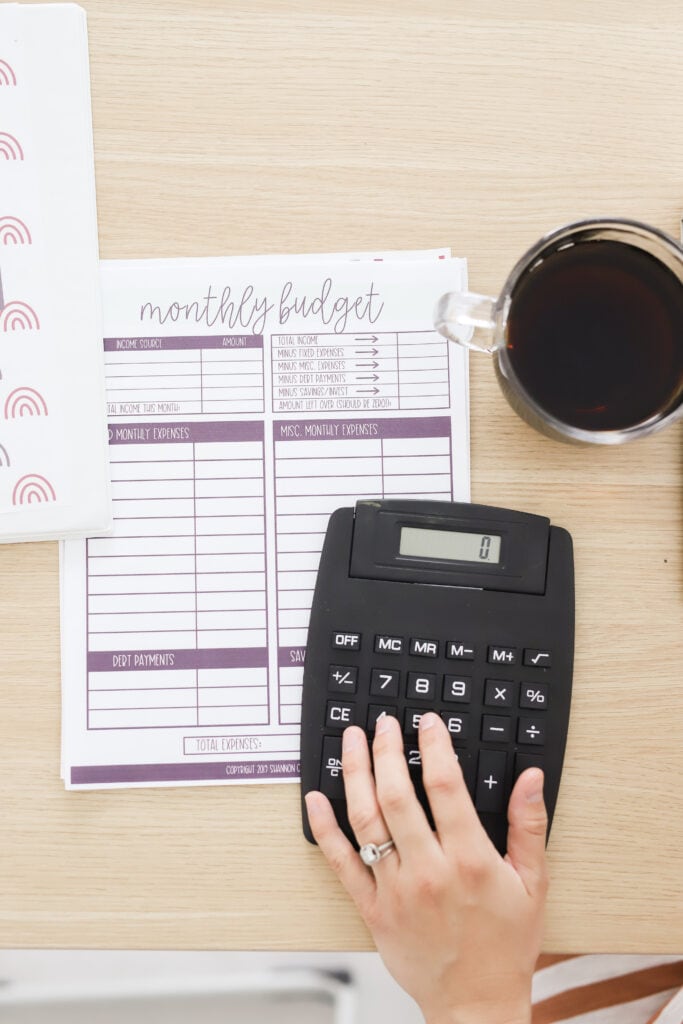Can you survive on a low income in today’s world? It may feel impossible to survive in today’s society on a low income, but I can promise you it is not. Though it may take sacrifices and scrimping, it can be done.

Living a lavish lifestyle on a low-income budget is probably out of your reach for now, but being able to survive and secure the essentials you need every month is absolutely doable if you create a strict budget and stick to it.
The most important parts of living and covering essential costs on a low income are creating a strict budget for monthly spending, cutting out unneeded expenses, and maximizing your income. There are many different ways to maximize your income by managing your money better, tracking expenses, and even possibly looking into a side hustle or making a hobby into a new way to increase your monthly income.
In this post, we will go over all the tips and tricks to get by with a low income. Whether you are a student, trying to work your way up with your goals, or living on a fixed income due to other circumstances, this post can help you manage the income you have in the meantime and make sure you have everything you need to live in today’s world.

Why budgeting your money is essential when you have few resources
Budgeting your money is essential when you have low income and few resources because you have to know where your money is going and how to properly allocate the money that is coming in. Budgeting allows you to gain more control over your finances and to be an active and watchful participant in your spending. While this does not mean you can’t have any fun or maybe eat fast food once in a while, it does mean that you will know how much money you have to allocate to miscellaneous things like that and don’t overspend.
It may seem impossible to escape the issues that come with living on a low-income wage, but there are steps to take to budget properly so you can finally not feel like you have to choose between rent and groceries for the month. Overspending can be happening right under your nose, and you just don’t know because you don’t track your expenses and budget accordingly! Being aware and in charge of your finances puts you in control over your spending and saving.

How to Make a Monthly Budget you can live off of
Analyze your expenses
The first step of making a monthly budget is going to be analyzing your expenses, and your money flow in general. This means pulling bank statements, collecting bills, and actually looking at your utility statements. You should list out all of your average monthly expenses. One helpful way to do this is by using a tracker template, like this one.
This tracker helps you to stay consistent in your planning and in your expense tracking. It offers several different templates for many different aspects of budgeting that will make your life much easier. Using a template to list your expenses lets you visualize where your money is going every month, and that is where you want to start in building your budget! Knowing where your money is going is the most important part of building a budget because you find ways to reduce your spending that way. Another essential part of building a budget is to make sure your spending has a purpose that you have scheduled out.
Cover essentials
The next part of building a monthly budget for those living off of low-income is to make sure you factor in the income you make with the essentials you will absolutely need to cover. These essentials are referred to as the “four walls” and are covered by the personal finance buff, Dave Ramsey.
You can read more about Dave Ramsey’s budgeting tips relating to the essential four walls, here. I will cover a rundown of the essentials in this post, starting with the description of the four wall essentials. These would be housing, transportation, food, and utilities. These are the basics that everyone will need to make sure they have to keep themselves secure. Since we analyzed our spending and our incoming money flow in the previous step, we can safely calculate the amount we need to cover these essentials.
For a low-income budget, you should be able to cover these four things. If you can’t, then the rest of this post will give you more tools to help decrease excess spending or increase income.

Create a goal
You should always have a goal for your budget. This is because it will keep you motivated to continue on your budgeting path and maintain vigilance over your finances. The goal can be anything like getting out of debt, putting away a certain amount of money into a savings account for emergencies or a big purchase, or any other clear goal you can think of.
You should have a clear goal set with your budgeting so that you can also have a clear plan for where all of your money is going. Part of the budget is to set guidelines, not just track your money flow; you have to be an active participant in the process. If you are worried, you may just be monitoring your finances rather than actively budgeting, then this post has some great tips that can further help you along your journey.
Stick to it
The final step of budgeting is to actually stick to it! You can set up a great budget plan, but if you do not consistently follow through, then you don’t reap any of the benefits or see any results. Sticking to a budget can be hard, especially if you are new to it, but as we mentioned, it is essential to be an active budgeter rather than someone who just monitors their account balances.
There are many different tips and tricks for sticking to a budget, but one of my favorites is the cash envelope budgeting system. Cash envelope budgeting using a system of, you guessed it, envelopes filled with cash. Since paper money is a physical manifestation of what you are spending, the idea is that it will show you how much of your money is leaving your account every time you spend it. Swiping a card is easy, but counting out multiple 20-dollar bills will make you think twice.
This system relies on different envelopes labeled for different categories of spending. If you’re working on a low-income budget, then some categories you should include are your four-wall essentials of food, housing, transportation, and Utilities. You can also add extra categories for emergencies, miscellaneous, and any other category you think is necessary. Each month you will fill the envelopes with a set amount of cash that is the average spending on your expenses in these categories.

From there, you know that you have all of your set amounts covered for your expenses. If your utilities are higher than usual, then you should take the right amount of cash out of your envelopes that you are using for other things, but don’t put more money in once you have set your cash amounts. Since we are in an age of technology, if you pay a lot of bills online and would rather keep it that way, then instead of doing the cash envelope method, you can try a no-spend month challenge! This is exactly what it sounds like, as you will pick a month to only pay for your essentials! You will be surprised at the savings and may want to make more cuts on some splurges you have previously been okay with.
How can I save money with a low income?
Eat at Home
There are several different ways to save money while you’re living on a low income, one of the first being to eat at home more than going out. This can seem simple, but we often fall into the line of thinking that fast food is cheap, so why not just stop and get something? It won’t be expensive.
However, if you have this train of thought for the whole month the fast food adds up to be a whole new category of your expenses, while groceries you spent money on are still in the kitchen. You want to make sure you are eating at home, so you don’t end up wasting money on groceries. Food is essential, so it is one of the easiest ways to overspend.
By cooking at home, you can save more money because if you buy groceries and eat fast food, then you are effectively spending twice as much on food and not utilizing what you have. Some groceries may also go bad if you tend to eat out at places rather than staying in and that also turns into wasted money and food. The best ways to keep yourself to this and prevent overspending is to schedule out your meals and pack lunches. In fact, a Visa survey showed that the average American spends about 53 dollars a week eating out for lunch. That adds up! So, an easy way to combat this expense is to pack your lunch every morning at home and take it with you. The same goes for coffee. That 3-dollar cup of coffee may seem innocent, but if you’re spending that every day, then you will probably be more likely to just make your own at home for cheaper.

Invite friends over
If you have friends, coworkers, or family members that are always wanting to go out to eat at restaurants, go shopping, or participate in any other activities that frequently cost money, then you may have to rethink how many times you agree to these plans. It can seem embarrassing to tell people that you don’t have enough money to go out, but you don’t have to present it that way.
Instead, you can offer them to come to your house for a movie night, game night, or just to have a simple dinner together. This way, you avoid paying any excess fees in order to spend time with the people you care about. You could also offer to cook or bring games and movies over to another friend’s house. That way, you can avoid cleaning your place and still get to have a fun night.
There are many ways to enjoy time with your friends that don’t involve creating another bill to pay along the way. It is important to remember that you can go out every once in a while, if you have budgeted well and allotted for a splurge here and there, but don’t make a habit of it because those costs can add up.
Carpool/ Public transit
If you’re looking to save money, one thing to look at is the amount you spend on transportation. Usually, we spend money on gas, routine car maintenance, and a car payment if you have one. These things are inevitable if you own a car, but there are ways to diminish the costs. First, if you are spending too much on gas, it is worth a shot to try and see if you can carpool with anyone in the area. Maybe you have a friend or neighbor you know well who drives right past your workplace on their morning commute. If that’s so then it is definitely a great option to ask them if they mind carpooling. You can also carpool to other events such as school-related things for your kids or even if your friend is going to the grocery store and you know you need to go too. Little things like this will add up as you save money on gas.
These same concepts apply to public transit as well. While public transit may be harder to access in more rural areas, if you live close to or in a city, there is usually a form of public transportation. This is another great way to save money on gas and is often how many people commute daily if they can’t afford to buy their own vehicle or just want to be more economical.

Be mindful of utilities
Many of us may not actually look at our monthly billing statements for utilities, let alone compare them across several months, but you should! Being aware of the costs of your utilities will help you to be aware of how to bring down the costs. That means not leaving the lights on when you leave the house, not leaving every light on in the house, keeping the thermostat at a comfortable (and affordable) setting that doesn’t get changed often.
There are many ways to be better about your use of electricity and even water. To minimize overpaying a water bill, remember to never leave the water running, sometimes we may want to leave the faucet on the whole time we are in the bathroom for our morning routine or the entire time we’re doing dishes but it is very wasteful and ends up costing a lot more than just turning it off and then back on when you really need it.
Expenses You Can Cut From Your Monthly Budget
TV streaming platforms
In the day and age of streaming TV shows, you may be subscribed to up to 15 different streaming services! How often do you really watch those services? If your answer is, well, not that much, then it is time to cancel that subscription. Condense your streaming options down to the ones you use the most frequently. This way, you don’t waste money every month on a service you don’t even use or rarely use.
Cable TV
Cable TV is another bill you might be able to cut out entirely, if you find yourself using streaming services far more than you watch cable, it’s time to ditch the cable bill! If you’re on a low-income budget and are an avid TV watcher, it is time to sacrifice one of your watching methods. If you have cable and streaming services, it is time to pick your favorite and then cut out the other ones. This way, you still get to watch TV, but you’re not paying for it twice.

Music streaming platforms
Much like the last category, if you have multiple streaming platforms, then it is time to let one of them go. While you may like the variety, it is not worth it to pay for multiple different platforms every month. Pick the one you like the most and stick with it. In fact, most of these music streaming platforms can still be used without a subscription, with limited features and the inclusion of ads, but it is worth it to think about canceling all of your subscriptions to these services to save money, even though you may have to listen to a few ads.
Fast Food/ Restaurants
We discussed this in our other section about ways to save money, and it’s true. Cutting out fast food and restaurants is absolutely an unneeded expense that you can cut from the monthly budget. Instead of eating out for lunch every day, save the money and bring a lunch you packed from home. As for restaurants, an occasional outing may be okay if your budget can handle it, but why not cook for your friends instead!
Unused Gym Memberships
Gym memberships are notorious for being hard to cancel, but I promise you it is worth it. If you never use that gym that you are paying a monthly fee to go to, then that’s probably not going to change anytime soon. Call the gym and go through whatever cancellation process they have to save that money because most of the memberships can cost quite a bit of money. Remember, there is no need to keep paying for a service that you have not or are not planning to use frequently.
Side Hustles Anyone Can Do
Sell Clothes
If you’re looking for a way to make extra money on the side, then going through all of your new or gently used clothes that you never wear is a perfect place to start. Sites like Poshmark and eBay are great places to sell your clothes that you don’t wear and don’t need taking up space. There are even some vintage stores that will look through your giveaway clothes and offer to pay for them. This is also worth a shot. You can clear your closet and fill your wallet.
Make a Hobby Profitable
If you have a hobby that you enjoy doing in your free time, it may be time to start thinking if you can make it lucrative. Painting, crocheting, 3D printing, jewelry making, and many other crafts are wonderful ways to let out your creativity while making some extra money on the side.

Be a Rideshare/Delivery Driver
Whether it’s Uber, Lyft, DoorDash, GrubHub, or any other driver service app out there, it is a great way to make extra cash on the side. These apps are getting more and more popular, and if you live in a heavily populated area, then you will find no shortage of jobs to accept near you. The best part is you can make your own schedule by only accepting the jobs when you want them or when you have the free time.
Use Freelance Apps
TaskRabbit and FlexJobs are just two of many freelancing apps out there. TaskRabbit is a freelance app where you can find jobs in your area relating to your specific skill set, from moving furniture to dog walking. There is an assortment of odd jobs to find on this app that will help you earn more money. FlexJobs is another freelance platform, but the good thing about this one is that it markets to online jobs. That means if you have writing, graphic design, or transcription experience, then you can find plenty of opportunities for side hustles with this app.
If you’re struggling to budget money a low income, don’t lose hope! Work on decreasing your expenses and learning to budget first, then you can work on increasing income with extra hours or side hustles.






